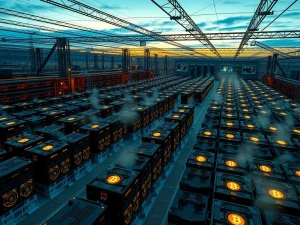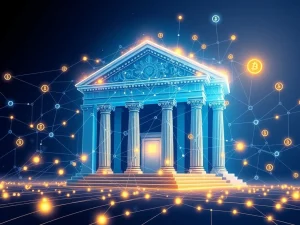XRP Ledger Unleashes Revolutionary $130M Agribusiness Credit Tokenization in Brazil

The world of finance is undergoing a profound transformation, and real-world asset (RWA) tokenization is at the forefront of this revolution. For those tracking the pulse of cryptocurrency news, the recent surge in RWA tokenizations, particularly on the XRP Ledger, signals a pivotal shift. Imagine unlocking vast amounts of capital, reducing costs, and democratizing access to finance for sectors that traditionally struggle with liquidity. This isn’t a distant dream; it’s happening now, with Brazil leading the charge.
XRP Ledger Powers Brazil’s Agribusiness Transformation
Brazilian fintech firm VERT has made headlines by launching a pioneering tokenized private credit platform directly on the XRP Ledger. This isn’t just another blockchain experiment; it’s a strategic move to digitize real-world assets, especially in dynamic emerging markets. The platform’s debut saw an impressive $130 million issuance of Agribusiness Receivables Certificates (CRA), a critical financial instrument for Brazil’s robust agricultural sector. By tokenizing these certificates, VERT aims to simplify capital access for businesses and significantly cut down transaction costs, leveraging the efficiency of decentralized infrastructure.
Brazil’s agribusiness is a powerhouse, contributing significantly to the nation’s GDP. Yet, like many traditional sectors, it faces hurdles in accessing timely and affordable financing. The XRP Ledger offers a compelling solution, enhancing credit structuring and streamlining regulatory compliance through its blockchain capabilities. VERT’s collaboration with Ripple underscores the growing confidence in the XRP Ledger’s ability to support complex tokenized assets. In fact, the ledger now boasts over $118 million in RWA tokenizations, a staggering 2,260% increase in just six months.
Understanding the Surge in RWA Tokenization
The monumental 2,260% surge in RWA tokenization on the XRP Ledger isn’t just a number; it represents a paradigm shift in how value is represented and exchanged. Tokenizing private credit obligations allows for fractional ownership, meaning even small investors can participate in previously inaccessible asset classes. Furthermore, the XRP Ledger’s energy-efficient consensus mechanism and sub-second finality enable real-time settlement of loans, a stark contrast to the days or weeks often required in traditional finance.
This approach directly tackles inefficiencies prevalent in conventional credit workflows. Small-to-medium enterprises (SMEs) in Brazil, for instance, frequently encounter bureaucratic delays and high operational costs that limit their financing options. By moving these processes onto a blockchain, VERT is creating a more agile and cost-effective system. The initial $130 million issuance has already garnered significant interest from institutional investors, signaling strong confidence in RWA-backed tokens as a viable investment avenue.
VERT: A Pioneering Brazilian Fintech Initiative
VERT, as a leading Brazilian fintech, is not stopping at $130 million. The company plans to tokenize an additional $370 million in assets, further expanding its reach. A key component of this expansion is leveraging Ripple’s Ethereum-compatible XRPL EVM Sidechain. This sidechain will introduce smart contract functionality, enabling programmable automation and more complex financial operations that can adapt to evolving market needs.
The project highlights the XRP Ledger’s competitive advantages in the RWA tokenization space, particularly its low-cost transactions and superior scalability. While established DeFi ecosystems on Ethereum-based platforms offer liquidity, their high gas fees and slower settlement times can be prohibitive, especially for SME-focused projects. VERT’s strategic choice of XRPL aligns perfectly with its cost-efficiency goals, though it does raise questions about seamless interoperability with the broader RWA markets dominated by other chains. Nevertheless, VERT’s success could pressure traditional financial institutions to embrace similar technologies, particularly in markets like Brazil, where the Central Bank’s digital asset sandbox provides a favorable testing ground for innovation.
Unlocking Capital for Agribusiness Credit
The focus on agribusiness credit in Brazil is particularly insightful. This sector is a cornerstone of the Brazilian economy, yet its financing often remains bogged down by traditional complexities. Tokenization offers a powerful solution to unlock liquidity and improve access to capital. Here’s a quick comparison of how tokenized credit on XRPL stacks up against traditional methods:
| Feature | Traditional Credit | Tokenized Credit (XRPL) |
|---|---|---|
| Access | Often limited for SMEs, bureaucratic | Streamlined, broader access, fractional ownership |
| Costs | High transaction/operational costs | Reduced costs, efficient |
| Settlement | Slower, multi-day processes | Real-time, sub-second finality |
| Transparency | Opaque, less visibility | Enhanced transparency on blockchain |
| Liquidity | Illiquid, harder to trade | Potentially increased liquidity (fractional) |
| Efficiency | Manual processes, prone to errors | Automated, programmable (via smart contracts) |
This initiative reflects a broader trend of blockchain adoption in emerging markets, where existing systemic inefficiencies create immediate and tangible value for tokenization. By addressing Brazil’s agribusiness sector, VERT taps into a segment of the $5 trillion global private credit market, positioning itself to scale tokenized solutions significantly if regulatory frameworks continue to evolve favorably.
The Future of Tokenized Assets on XRPL
The long-term success of tokenized assets on platforms like the XRP Ledger hinges on several factors, including regulatory clarity and interoperability. While the initial announcement from VERT did not include detailed risk disclosures regarding investor protections against borrower defaults, the integration of robust smart contract mechanisms or third-party risk assessments could significantly bolster institutional confidence in this innovative model.
Overall, VERT’s tokenized platform is a compelling demonstration of blockchain’s immense potential to modernize capital markets. It promises enhanced transparency, greater liquidity, and improved accessibility for asset classes that have historically been opaque and illiquid. If this project achieves its ambitious $500 million tokenization target, it could very well serve as a blueprint for other emerging economies looking to unlock new avenues of liquidity and drive economic growth. The XRP Ledger’s pivotal role in this evolution highlights its appeal as a scalable, cost-effective infrastructure for RWA tokenization, cementing its position as a key player in the future of finance.
Frequently Asked Questions (FAQs)
What is RWA tokenization?
Real-World Asset (RWA) tokenization is the process of representing ownership of tangible or intangible assets (like real estate, commodities, or credit) on a blockchain as digital tokens. This allows for fractional ownership, increased liquidity, and easier transfer of these assets.
How does the XRP Ledger facilitate RWA tokenization?
The XRP Ledger (XRPL) is designed for high-speed, low-cost transactions and offers sub-second finality, making it ideal for tokenizing assets. Its energy-efficient consensus mechanism and upcoming EVM Sidechain for smart contracts provide a robust infrastructure for managing tokenized private credit and other RWAs.
What is the significance of VERT’s $130 million agribusiness credit tokenization?
This initiative marks a significant step in digitizing finance for emerging markets, particularly Brazil’s crucial agribusiness sector. It demonstrates how blockchain can streamline capital access, reduce transaction costs, and enhance liquidity for traditional industries, potentially serving as a model for other economies.
What are the benefits of tokenizing agribusiness credit?
Tokenizing agribusiness credit can provide several benefits, including faster access to capital for businesses, reduced operational costs, increased transparency for investors, and the potential for fractional ownership, which democratizes investment opportunities and enhances liquidity.
What challenges does RWA tokenization face?
Key challenges for RWA tokenization include achieving clear regulatory frameworks that reconcile blockchain’s decentralized nature with existing financial laws, ensuring interoperability across different blockchain platforms, and implementing robust risk disclosures and investor protection mechanisms for tokenized instruments.






